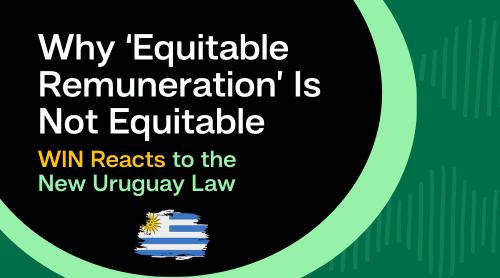29/11/2023

This month, a new right to ‘Equitable Remuneration’ for performers on streaming was introduced in the Ley de Rendición de Cuentas y Balance de Ejecución Presupuestal (Accountability and Budget Execution Law) passed by the Uruguayan Parliament. Independent record labels and self-releasing artists are deeply concerned about the consequences of such a model for the economy of the local indie sector.
The law introduces an additional Making Available right for performers applicable to the internet and digital networks, to be managed by Collective Management Organizations. This will be adding a layer of red tape on top of the current commercially negotiated licensing system.
There was no stakeholder consultation, no impact assessment, no industry negotiations. WIN and the Uruguayan record label community spoke out about the unintended consequences of introducing this new right. Unfortunately, our concerns were not heard.
Streaming has become a crucial source of income for the Uruguayan independent sector. This stream of revenues grew from 19.4% of the recorded music market in 2019 to more than 50% today, an incredible growth trend that will be halted by the introduction of this new right.
The remuneration of featured artists on the internet is already effectively exercised through their Making Available right under commercially licensed terms. They are paid either via royalties from the record labels or directly from the digital platforms in the case of self-releasing artists. As for session musicians, they are paid a lump sum up front.
‘Equitable remuneration’ is not ‘fair payment’ in the sense that is commonly understood. It is a legal mechanism that allows for compensation to be paid to rightsholders whose work is used commercially where they have no rights to say ‘no’ or to negotiate a payment, such as broadcasting or public performance.
We are ardent advocates of collective management in these areas where it would not be possible to negotiate individually. But this is not suitable for streaming, where artists and labels are already implementing direct deals (for instance, through licensing bodies like Merlin). Streaming is not radio! It is core business where rightsholders should be able to say yes (or no) and negotiate commercial terms.
In practice, the introduction of the additional right to ‘Equitable Remuneration’ for streaming means adding new players in the ecosystem. This complicates administrative management by the digital platforms and increases their costs. Furthermore, the rates paid under ‘Equitable Remuneration’ are generally lower compared to commercial ones.
This additional right can be seen as a double payment since streaming platforms already pay artists. There is no precedent of this in Latin America. In Sweden, one of the only countries where this question was the subject of an official inquiry, the conclusion was that applying ‘Equitable Remuneration’ to digital revenues is simply not compatible with copyright.
Last week, Spotify announced that it will cease service in Uruguay by February 2024. Among the reasons given are the lack of clarity on whether the additional payment should be deducted from what is paid to rightsholders or if it will be borne by the streaming platforms.
The ‘Equitable Remuneration’ right harms other stakeholders in ways that affect medium and long-term investment in new music. Independent record labels account for 80% of new music releases, and anything that reduces their capital for investment in new artists and projects has a huge impact.
The effects will be disastrous for small record labels and particularly for self-releasing artists. Instead of every peso generated on streaming platforms going directly into their pockets, they will have to wait for slower distributions from the Collective Management Organizations with a substantial administrative fee. And this is for those artists who are members, which is not the case for many emerging acts in Uruguay.
A reform of this magnitude should not have been addressed in an accountability act. It fundamentally changes copyright law and affects not only music users and consumers, but also numerous rightsholders both inside and outside the country. It is tempting to believe that so-called Equitable Remuneration is a silver bullet, but what we need is to maximize income from streaming. This will not be achieved by fighting for the crumbs and creating a new right which only adds complexity to the system and will not result in equitable pay-outs to artists.
Noemí Planas, CEO of WIN
The independent sector fervently believes in the need to maximize income from streaming, but the reality is we need cumulative action on multiple levels to achieve real reform. Together with our sister European association IMPALA, we are putting forward possible solutions (see It’s Time to Challenge the Flow #2 – Revisiting how to make the most of streaming).
Some of the measures we propose are getting more money into the market (for example, increasing subscription prices); ensuring that streaming platforms allocate income without distortions; addressing unlawful activity; and adequate royalty agreements between artists and record labels. WIN also promotes the Fair Digital Deals initiative through which record labels can commit to treating artists fairly and sharing new types of digital revenue with them.
The independent music community supports artists and is willing to contribute to building better models for creators, fans, and digital services to make the most of streaming opportunities. WIN and our member associations are open to working with all stakeholders towards this goal.
Worldwide independent music community calls for joined-up approach on GenAI through high More
WIN’s CEO Noemí Planas and representatives from Latin American affiliates AMI Paraguay More
Ten core principles representing the collective position of the independent music sector More